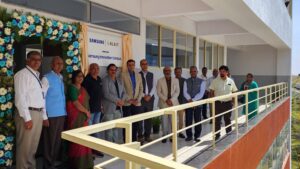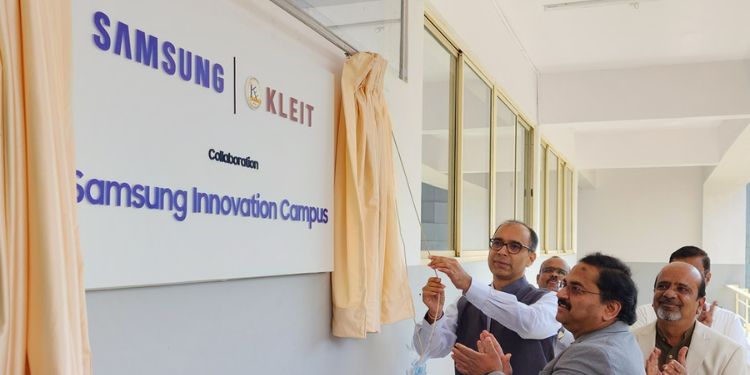Samsung R&D Institute Bangalore (SRI-B) has inaugurated the Samsung Innovation Campus programme at the KLE Institute of Technology (KLEIT), Hubli to upskill youth in future tech domains such as Machine Learning, Artificial Intelligence, Coding & Programming, and Data Science. This initiative strengthens Samsung’s commitment towards the Government’s Skill India initiative as part of its vision of #PoweringDigitalIndia.
At the classroom facility, students and faculty at KLEIT will work on advanced technology training as well as projects on domains such as Machine Learning, Artificial Intelligence, Coding & Programming, and Data Science to make students industry-ready. Through the integration of technology, basic software skills and emerging capabilities, the programme seeks to empower its participants to grow into well-rounded professionals.
Additionally, the initiative also intends towards faculty development program through mentorship from SRI-B, to bridge the gap between industry and academia.

The Samsung Innovation Lab was inaugurated at the KLEIT by Mohan Rao Goli, CTO, SRI-B along with Prof. Rajesh Hegde, Dean (R & D), IIT Dharwad, in presence of Prof. Ashok Shettar, Vice-Chancellor, KLE Technological University and other distinguished members including Srimanu Prasad, Head, Tech Strategy, SRI-B and Prof. Sharad Joshi, Principal of KLEIT.
“The goal of the Samsung Innovation Campus is to contribute to the development of India by empowering youth, through education, training and development,” said Mohan Rao. “Our partnership with KLEIT is a stepping stone towards creating an innovation centre that brings out the potential of the youth and trainers,” he elaborated. “This collaboration will not only enhance our research & development capabilities in emerging areas, such as Artificial Intelligence, Machine Learning, Big Data, and IoT etc. but will also connect us with a talent pool that will build innovative solutions to real-life problems.”
Expressing optimism at the new partnership, Prof. Ashok Shettar, Vice-Chancelor of KLE Technological University, opined that the initiative will significantly contribute to India’s advancement in the critical new technology fields, and that will empower the youth of the country to effect positive change.
“Through the creation of this Innovation Centre, our students will gain invaluable insights to challenges facing the industry and will learn to develop technical skills to solve them,” he said. “We are optimistic about our partnership with Samsung to significantly contribute to India’s advancement in these critical new technology fields.
Through this initiative, SRI-B plans to upskill about 100 students and professors per year at KLEIT.
SRI-B is already working with four engineering colleges across Karnataka and Andhra Pradesh, engaging more than 500 students on courses of Artificial Intelligence, Coding & Programming, IoT, and Big Data. More than 100 students have already received their certification of completion.
The demand for engineers/scientists with knowledge in Machine Learning, Artificial Intelligence & Data Science is high. With the rise of Artificial Intelligence and Machine Learning, Samsung is providing students with the tools they need to succeed in these growing fields. The Samsung Innovation Campus curriculum is designed to help close the skills gap and provide opportunities to students for growth in their job roles.
Samsung Innovation Campus acts as a hub for students and professors to work with SRI-B experts that enables them to have an in-depth understanding of the technologies through hands-on exposure to solve real-world challenges using cutting-edge Technologies.
It is the company’s global citizenship programme that aims at bridging proficiency gaps in the country by skilling students on cutting-edge technology. Samsung has so far set up eight Samsung Innovation Labs in IIT-Delhi, IIT-Kanpur, IIT-Hyderabad, IIT-Kharagpur, IIT-Roorkee and IIT-Guwahati, IIITDM-Kurnool and IIT-Jodhpur as part of its Samsung Innovation Campus programme. So far, these labs have trained over 1,000 students.
















